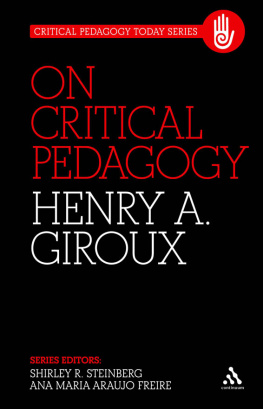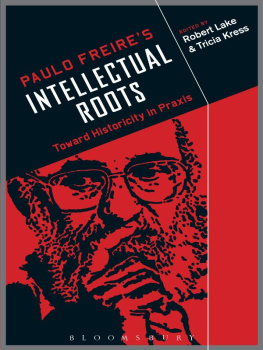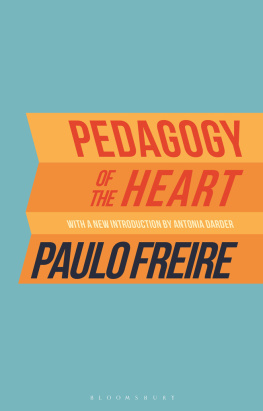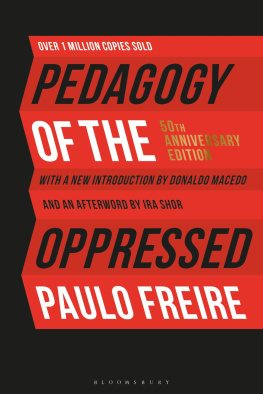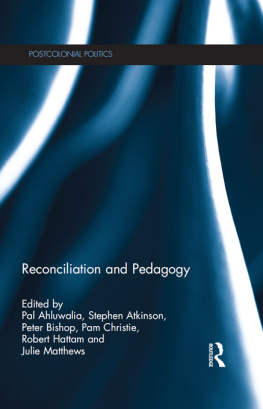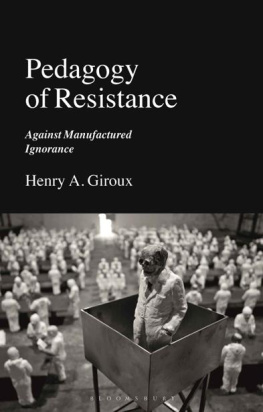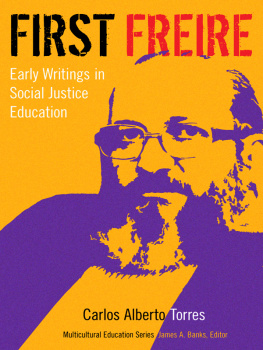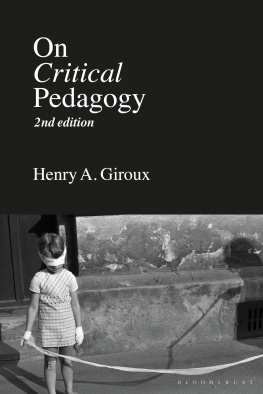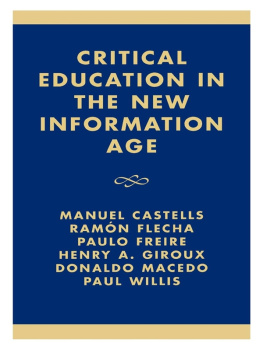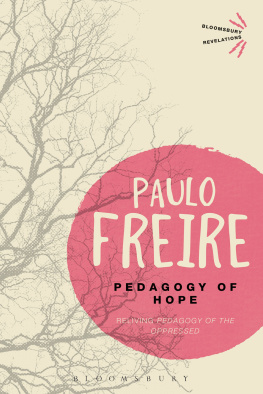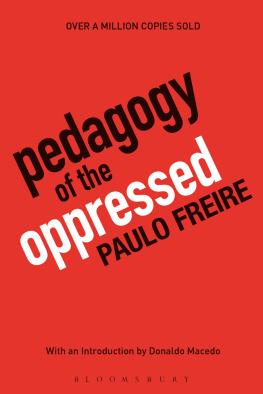For Susan.
I would also like to thank the Social Sciences and Humanities Research Council of Canada for their generous support in enabling me to finish this book.
Chapter 1
Critical Pedagogy in Dark Times
Some of the essays in this book were composed over 30 years ago, while the majority were written in the last decade that the earlier essays remain relevant speaks to the ongoing attack on the very nature and condition of public and higher education in the United States. In recent years, there has been a resurgence of the logic and arguments that were first used against critical education in the 1970s and 1980s today, ironically, they are put forth by their proponents in the name of educational reform. Three decades ago, it was precisely the dismantling of educations critical capacity in conjunction with the emergence of a politics of authoritarianism that motivated my involvement in the field of education, and critical pedagogy in particular. What all the essays in this book have in common is the belief that education is fundamental to democracy and that no democratic society can survive without a formative culture shaped by pedagogical practices capable of creating the conditions for producing citizens who are critical, self-reflective, knowledgeable, and willing to make moral judgments and act in a socially responsible way. I recognized early on in my career that critical pedagogy as a moral and political practice does more than emphasize the importance of critical analysis and moral judgments. It also provides tools to unsettle commonsense assumptions, theorize matters of self and social agency, and engage the ever-changing demands and promises of a democratic polity.
Critical pedagogy takes as one of its central projects an attempt to be discerning and attentive to those places and practices in which social agency has been denied and produced. When I first began exploring and writing about critical pedagogy, I became aware that pedagogy might offer educators an important set of theoretical tools in support of the values of reason and freedom. During this time, I was teaching history to high school students. For me, critical pedagogy as theoretical and political practice became especially useful as a way to resist the increasingly prevalent approach to pedagogy that viewed it as merely a skill, technique, or disinterested method. Within this dominant educational paradigm, young people were at one time and are now once again shamelessly reduced to cheerful robots through modes of pedagogy that embrace an instrumental rationality in which matters of justice, values, ethics, and power are erased from any notion of teaching and learning. I rejected the mainstream assumption that treated pedagogy simply as a set of strategies and skills to use in order to teach prespecified subject matter. Critical pedagogy is not about an a priori method that simply can be applied regardless of context. It is the outcome of particular struggles and is always related to the specificity of particular contexts, students, communities, and available resources. It draws attention to the ways in which knowledge, power, desire, and experience are produced under specific basic conditions of learning and illuminates the role that pedagogy plays as part of a struggle over assigned meanings, modes of expression, and directions of desire, particularly as these bear on the formation of the multiple and ever-contradictory versions of the self and its relationship to the larger society. My view of critical pedagogy developed out of a recognition that education was important not only for gainful employment but also for creating the formative culture of beliefs, practices, and social relations that enable individuals to wield power, learn how to govern, and nurture a democratic society that takes equality, justice, shared values, and freedom seriously. I began to see how pedagogy is central to politics in that it is involved in the construction of critical agents and provides the formative culture that is indispensable to a democratic society.
Wedded to a narrative of triumphalism and economic growth, education in the late 1970s and early 1980s was increasingly viewed less as a public good than as a private right. But there was more at stake in the emergent field of critical pedagogy than mapping the modes of economic and cultural domination that tied schools to new regimes of privatization, commodification, and consumerism. There was also an attempt to view schools as sites of struggle, to open up pedagogical forms to the possibility of resistance, and to connect teaching to the promise of self- and social change. As part of such an understanding, I attempted early on in my work to employ a notion of critical pedagogy that marshaled a language of critique and hope. While over the last three decades my understanding of the insights offered by critical pedagogy has expanded to spheres outside the classroom, the principles explored in my earlier work represent a crucial foundation. In order to address the struggles facing public and higher education today, I find it increasingly necessary to go back to these foundational principles as a starting point for explaining the value of a democratically informed notion of education and the importance of critical pedagogy.
The principles guiding my work on critical pedagogy are grounded in critique as a mode of analysis that interrogates texts, institutions, social relations, and ideologies as part of the script of official power. Put simply, critique focuses largely on how domination manifests as both a symbolic and an institutional force and the ways in which it impacts on all levels of society. For example, schools are often rightly criticized for becoming adjuncts of corporations or for modeling themselves on a culture of fear and security. Often this position goes no further than simply analyzing what is wrong with schools and in doing so makes it appear as if the problems portrayed are intractable. Domination in this mode of discourse appears to be sutured, with little room to imagine any sense of either resistance or hope. While it is important to politicize the process of schooling and recognize the gritty sense of limits it faces within a capitalist society, what is also needed to supplement this view is an enobling, imaginative vision that takes us beyond the given and commonplace. Against the anti-democratic forces shaping public and higher education, there is a need to mobilize the imagination and develop a language of possibility in which any attempt to foreclose on hope could be effectively challenged. In this instance, the language of hope goes beyond acknowledging how power works as a mechanism of domination and offers up a vocabulary in which it becomes possible to imagine power working in the interest of justice, equality, and freedom. Examples of such a discourse emerge in my analyses of schools as democratic public spheres, teachers as public intellectuals, and students as potential democratic agents of individual and social change.

